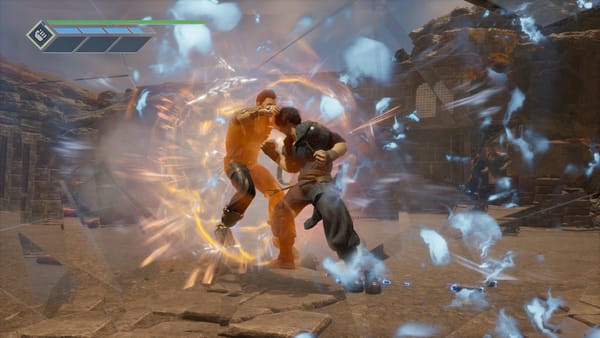#114: Ad astra
[Thanks for reading Hit Points! If this is your first time, then a hearty welcome to you. If you enjoy today’s edition, note that you can sign up for free to get this twice-weekly look at the latest goings on in the game industry sent straight to your inbox. It also gets you access to the full Hit Points archive. Thanks, and enjoy!]
It is tempting to see the news that Microsoft is building an in-game advertising platform for Xbox as further evidence that the sky is falling in. And sure, in the darker corners of certain game companies — the places where any new opportunity to squeeze another cent or two out of every user is eagerly seized upon — I can imagine there is no little rubbing of gleeful, devious hands going on at this potential new revenue stream. I admit I feared the worst when I saw the headline, but I’m not sure there’s too much here for your everyday Xbox player to be too worried about.
I do not think, for instance, that this means adverts are going to become part of the fabric of our trad-gaming lives. I do not see our immersion in the next Perfect Dark being broken by a Doritos advert on a roadside billboard, or a restorative potion in a future Dragon Age being brought to you by Monster Energy. For one thing, Microsoft has dabbled in this stuff before — it spent hundreds of millions on in-game ad firm Massive Incorporated in 2006, only to shut it down in 2010. I don’t think it is so daft as to try and take us all down that road again, because it knows where it ends, and how bumpy a journey it is.
Business Insider, which broke the news, says Microsoft is “moving cautiously”, limiting the platform to a handful of partners at first and ensuring advertising doesn’t “disrupt the gaming experience”. One example given is “digitally rendered billboards in a car racing game” and, well, I suppose it depends on what the advert is for. If it’s Raid: Shadow Legends or dishwasher rinse aid, or somehow based on my cookie-traced browsing history, then we may have a problem. But I struggle to get too upset about the idea of, say, an advert for tyres or some new Honda hybrid popping up as I drive a car around a track. Racing games are just big adverts anyway, if you want to get reductive about it, and in games that seek to embody some real-world fantasy there’s an argument that real-world advertising amplifies immersion, rather than cleaving it in two.
In any case, I’m not sure this is particularly designed with that sort of thing in mind. Instead, it’s about attracting new types of game to Xbox — with the understanding that as far as Microsoft is concerned the word ‘Xbox’ now transcends the concept of dedicated console hardware. Put in those terms, it starts to make a bit more sense. Free-to-play remains the game industry’s dominant distribution model, and in this era of cross-platform games there are plenty of mobile hits that could play pretty well on a Series X or S. Currently, however, the f2p sections on today’s console stores are comparatively tiny.
That said, this probably isn’t about consoles at all — not primarily, anyway. As the meaning of ‘Xbox’ transforms from a box under the living-room TV into a service that’s available on every device you own, powered either natively or by Azure, I suppose it makes sense that the range of software on offer should expand too. Microsoft CEO Satya Nadella said in 2020 that “Three billion people look to gaming for entertainment, community, and achievement and our ambition is to empower each of them, wherever they play.” Even a complete cornering of the console market, buying not just Activision but all the others too, would still leave Microsoft well short of reaching almost half the world’s population.
So, that means mobile, and free-to-play, and therefore advertising, because that’s how a lot of free-to-play games make their money. I can certainly see the logic in that, and it all seems fair enough. If I’m wrong — if Destiny loading screens are replaced with those Google construction-site ads that are plaguing my YouTube sessions at the moment, and stuff like that — then I will, of course, deny ever saying any of this.
MAILBAG!
- “Hi Nathan, I love Hit Points, keep up the good work,” writes Lewis, correctly identifying the correlation between an offer of fulsome praise and the chance of your reply being published. “One thing I thought after reading Hit Points #113 is just how little information developers have to go on when negotiating with subscription services, which must make it impossible to come up with a reasonable fee. If you don't know how many times a similar game to yours has been played or downloaded on a service like Game Pass, how on earth can you know whether the price you're being offered is a fair one? It seems to me that the platform holders have all the cards when it comes to negotiations, while developers are taking a wild stab in the dark when it comes to assessing how much their game might be worth.” A decent point, this, and one I’d like some feedback on from Hit Points pals with knowledge of such things. My instinct is that the bigger companies have enough existing internal information to help them make good decisions, and that the smaller ones talk amongst themselves enough to be able to reasonably ensure they’re not getting shafted, but yes, readers in the know, do hit reply and set me straight.
MORE!
- The first fruits of Sega’s ‘Super Game’ initiative are lavish new versions of Jet Set Radio and Crazy Taxi. Wow! The inevitable catch is that both are supposedly being modelled on Fortnite: free-to-play, cross-platform, stuffed to the gills with microtransactions. A massively multiplayer JSR sounds incredible, in fairness. Hit Points cautiously approves.
- Activision Blizzard has insisted in an SEC filing that it and Microsoft have not discussed how Bobby Kotick’s employment status might be affected when the proposed acquisition completes. Sure. Absolutely. I imagine there have been a few nudges and winks, though. Perhaps a hand gesture or two.
- Square Enix president Yosuke Matsuda has reaffirmed his commitment to a future powered by the blockchain. Matsuda’s latest comments reveal a subtle shift of perspective: rather than blathering on about play-to-earn as he did at the start of the year, he’s now talking about rewarding player creativity — effectively delegating the longevity of live-service games to players, who will be able to create and sell their own #content in-game. A sort of hyper-monetised take on Dreams, then, with killing the planet as a fun side-bonus.
- John Wick creator Derek Kolstad is adapting Streets Of Rage for the silver screen, which I suppose makes sense. Elsewhere, Jason Momoa is apparently on the hook for a Minecraft movie, which really does not.
- China’s broadcasting regulator has banned the livestreaming of games that have not been officially approved for release in the country, in its latest crackdown on a medium the government perceives as being harmful to the nation’s youth.
That’ll do! Another busy week ahead juggling Hit Points, multiple consulting projects, and the school holidays, so I’d best crack on. As ever, if you’ve enjoyed this, please interface with the below buttons in the manner of your choosing. Have a grand few days, and I’ll see you on Friday.





